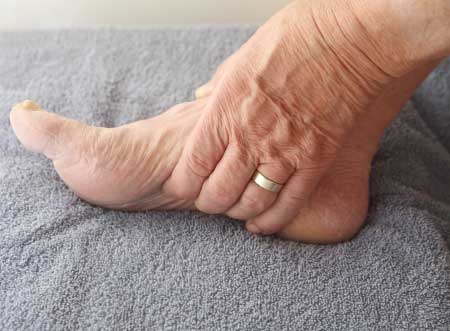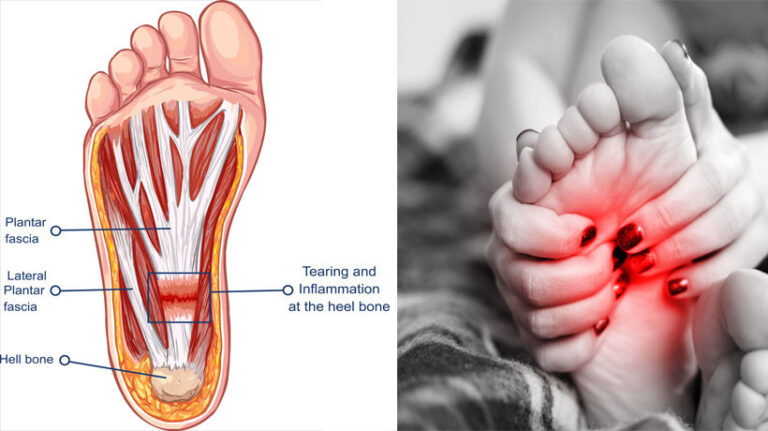CHRONIC FOOT PAIN
Our feet bear weight while standing and help us move around. The weight and pressure on foot is the most common cause of its pain. Foot pain implies any pain or discomfort in one or more parts of the foot, such as toes, heels, arches and soles.
The pain might range from mild to severe lasting for a short time or become an ongoing issue. The foot feeling sore for a week or two would gradually feel better. However, this is not a case of chronic foot pain. The chronic foot pain persists for weeks, months or years without any signs of stopping.
It usually ranges from a dull, persistent ache in the heel of your foot to stabbing pains around the base of your big toes. The chronic foot pain limits your ability to engage in leisure activities, enjoying with your loved ones, and accomplish tasks at work or home.

CAUSE OF CHRONIC FOOT PAIN
Chronic foot pain can occur due to various reasons including lack of movement, improper footwear, an underlying illness, or an injury. Foot pain might appear at any age. Depending on its severity foot pain affects the rest of your body, such as ankles, knees, hips, and back. Most common causes of chronic foot pain could be:
- Bone spurs
- Broken foot or toe
- Bunions
- Gout
- Plantar fasciitis
- Rheumatoid arthritis
- Stress fractures
- Buerger’s Disease
- Achilles tendonitis
- Ingrown toenails
- Sciatica
- Bursitis
- Fractures, strains, sprains and breaks
These are some of the causes behind foot pain, the list is long. Chronic foot pain is often difficult to diagnose if you don’t know where the pain is coming from.
It is important to know the source of the pain for prompt diagnosis and treatment such as:
- Arch Pain: This is usually caused due to aging, weight gain, overuse, stress, or a neurological issue. It is commonly caused due to over-pronation that is when the outside of your heel hits the ground first when you walk. Over a period of time this would damage your tendons, muscles, and ligaments, causing chronic foot pain. Arch pain is often caused by conditions such as plantar fasciitis and tendonitis as well as fallen arch or flat foot.
- Heel Pain: Heel pain or discomfort can be caused by achilles tendinitis, heel spurs or plantar fasciitis. Plantar fasciitis develops due to the tissue connecting your heel bone causing your toes to become inflamed. The pain sometimes worsens in the morning, and you may even feel pain in the arch of your foot.
- Ball of foot pain: The pain in the ball of your foot might be due to an overuse injury such as metatarsalgia causing painful inflammation. It can rarely be caused due to discomfort in the ball of your foot is Morton’s neuroma. This leads to a thickened section of nerve tissue between the bases of your toes. Women are more prone to this condition than men as they frequently wear high heels or tight-fitting shoes. A rare disease affecting teenagers is Freiberg’s disease which also causes pain in the ball of the foot. This involves a reduced blood supply to the foot around the second or third metatarsal bones near the toes. People complain of swelling, pain, and stiffness at the front of the toes.
- Toe pain: Gout and arthritis is the most common reason for toe pain. Gout is a kind of arthritis formed in your toes causing pain and swelling. This often affects the big toe. A bunion is another common foot ailment occurring on the edge of your foot. A bony lump forms next to the big toe due to wearing tight-fitting or uncomfortable footwear and genetics also may play a role. Pain in the big toe can also be caused due to ingrown nail, which can be painful and might cause an infection or swelling.
Sometimes foot pain could not be due to the above problems. Generalized foot pain or swelling could also indicate a blood flow issue. Damage to the nerves or blood vessels due to various conditions such as diabetes may cause swelling and pain.
Sometimes, the feet would temporarily swell in the heat or during pregnancy.

WHEN YOU SHOULD SEE A DOCTOR
If you experience intense pain, or have a high risk of conditions such as heart failure, swelling in the feet is an emergency.
You should contact a doctor right away if:
- One foot swells along with calf pain
- The feet swell dramatically and suddenly
- You are short of breath and have swelling or pain
You should not ignore the foot pain and speak to podiatrist if:
- Foot pain does not get better with home treatment
- Foot pain worsened following surgery
- Family history of arthritis
TREATMENT OF CHRONIC FOOT PAIN
The location of pain in the foot usually indicates the underlying cause that will determine if a medical treatment is necessary.
Podiatrists would recommend treatment plans for chronic foot pain based on the reason for the pain. These generally include:
- Orthotics: These include braces, supports, padding and specialized footwear for people suffering from chronic foot pain and other foot and ankle conditions. Orthotics might be temporary or permanent treatment for chronic foot pain. These are also helpful in correcting flat feet that might be quite painful. Orthotics help to improve the arch of the foot for more comfortable walking and everyday activities. Orthotics are available in medical stores or they can be customized as per your condition. These are helpful to reduce pain, inflammation, and swelling, especially for those suffering from plantar fasciitis, arthritis, diabetes, or metatarsalgia.
- Medication: Over-the-counter medications are helpful in reducing pain and inflammation of the affected area. These are also helpful in reducing the symptoms of arthritis or gout. Podiatrist would recommend medications such as:
- Biologic response modifiers — These are effective for swelling from bursitis or rheumatoid arthritis by blocking a step in the inflammation process without suppressing the entire immune system.
- Gout drugs — These reduce symptoms associated with bursitis and rheumatoid arthritis by reducing levels of uric acid in the blood to prevent future attacks of joint pain and inflammation.
- Disease modifying anti-rheumatic drugs (DMARDs) — These are prescribed to reduce arthritic pain such as psoriatic arthritis and rheumatoid arthritis.
- Analgesics — This may be used to relieve pain from foot problems and surgery.
- Corticosteroids — These help in relieving swollen and sore joints. These might be administered via a shot or in pill form depending on the location of the pain.
- NSAIDs — Podiatrists prescribe NSAIDs for mild to moderate pain.
- Physical Therapy: Exercises along with foot massage are helpful to ease foot pain. Exercises help in increasing the strength and stability as well as improve your flexibility. Flexibility helps to strengthen the muscle that is less likely to be injured in the future.
OUTLOOK
Some of the daily activities influence chronic foot pain. Extra weight on the body increases the stress on leg muscles, along with your feet and toe joints. Losing extra pounds helps in maintaining a healthy weight based on your body frame, type, and age may significantly impact your foot pain. It is good to visit a podiatrist to seek advice before starting any new complementary treatments, so that they do not conflict with medication you are already taking.
If you or anyone you know is suffering from foot problems, our expert providers at Specialty Care Clinics will take care of your health and help you recover.
Call us on (469) 545-9983 to book an appointment with our specialists.
